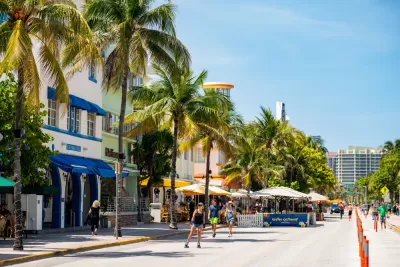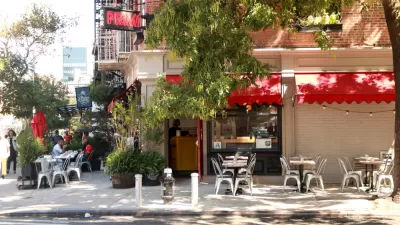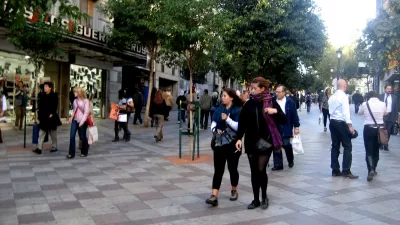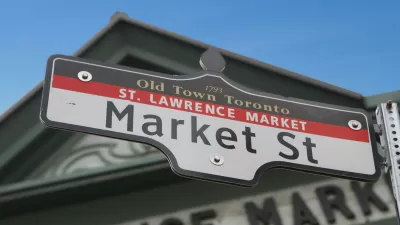The famous cruising strip was off-limits to cars during the pandemic. Now, the city is letting vehicles return with some pedestrian-oriented compromises.

"Like many cities around the world, Miami Beach responded to the Covid-19 crisis by transforming what was once a busy thoroughfare into a car-free space, allowing walkers, bikers and rollerbladers to roam free, and restaurants to expand their outdoor seating offerings." But starting January 24, the city will bring back one-way traffic on a ten-block portion of Ocean Drive, but with some pedestrian-friendly adjustments, reports Sarah Holder. The city is adding two-way bike lanes and keeping one block pedestrian-only.
The transformation of Ocean Drive into a 'slow street' drew both praise and criticism from locals, some of whom expressed the usual complaints about loss of parking and diverted traffic. Yet dire predictions about damage to the strip's vibrant restaurant, nightclub, and luxury car rental industry have not been borne out. In fact, Holder writes, "Resort taxes on food, beverages and room rentals each month of this fiscal year and several months of last have been higher than even pre-pandemic revenues, according to city data published in December 2021." Daniel Ciraldo, executive director of the Miami Design Preservation League, attributes the rise in revenue to the increase in people walking—and noticing businesses—on the street.
As cities begin to dismantle or adapt pandemic-era open streets programs, Miami is developing a long-term plan to prioritize pedestrians on Ocean Drive and the rest of South Beach, increase open space, and allow limited car access to accommodate local needs.
FULL STORY: Miami Beach’s Ocean Drive Revs Up for a Car Comeback

Maui's Vacation Rental Debate Turns Ugly
Verbal attacks, misinformation campaigns and fistfights plague a high-stakes debate to convert thousands of vacation rentals into long-term housing.

Planetizen Federal Action Tracker
A weekly monitor of how Trump’s orders and actions are impacting planners and planning in America.

In Urban Planning, AI Prompting Could be the New Design Thinking
Creativity has long been key to great urban design. What if we see AI as our new creative partner?

King County Supportive Housing Program Offers Hope for Unhoused Residents
The county is taking a ‘Housing First’ approach that prioritizes getting people into housing, then offering wraparound supportive services.

Researchers Use AI to Get Clearer Picture of US Housing
Analysts are using artificial intelligence to supercharge their research by allowing them to comb through data faster. Though these AI tools can be error prone, they save time and housing researchers are optimistic about the future.

Making Shared Micromobility More Inclusive
Cities and shared mobility system operators can do more to include people with disabilities in planning and operations, per a new report.
Urban Design for Planners 1: Software Tools
This six-course series explores essential urban design concepts using open source software and equips planners with the tools they need to participate fully in the urban design process.
Planning for Universal Design
Learn the tools for implementing Universal Design in planning regulations.
planning NEXT
Appalachian Highlands Housing Partners
Mpact (founded as Rail~Volution)
City of Camden Redevelopment Agency
City of Astoria
City of Portland
City of Laramie





























